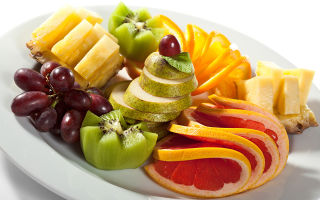Content
- 1 Why fruits are useful for the body
- 2 The most useful fruits for the human body
- 3 What fruits help you lose weight
- 4 Benefits of fruits for children
- 5 How to eat fruit properly
- 6 The use of fruits in cooking
- 7 Potential harm to fruits
- 8 Contraindications to eating fruit
- 9 How to choose and store fruits
- 10 Conclusion
Fruits are rich in vitamins, trace elements, fiber, contain a minimum amount of calories, are the basis of dietary and baby food. However, their use also has a negative side: to cause indigestion, surges in blood sugar, allergic reactions, destruction of tooth enamel. The benefits and harms of fruits are determined based on the individual tolerance of a particular product, the presence of diseases, a person's need for certain vitamins.
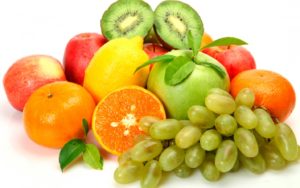
Why fruits are useful for the body
The benefits of fruits for the body lie, first of all, in the high content of healthy fiber, fructose, vegetable protein, pectin, and fruit acids. In addition, fruits contain a useful vitamin and mineral complex.
- Cellulose - is responsible for cleansing the digestive system, quickly saturates, maintains a feeling of fullness, thereby reducing the risks of overeating. Eating fruit in the evening avoids difficulties with fault detection in the morning: the gastrointestinal tract copes faster and better with the breakdown of food and the absorption of nutrients.
- Fructose - a kind of useful glucose that does not harm the figure, does not disturb the balance of sugar in the blood. The substance has a low calorie content, helps in weight loss, improves body tone, and is a useful source of energy.
- The benefits of fruit acids - in stimulating the regeneration of skin cells, saturating them with collagen and elastane, preventing moisture loss. Salicylic acid is useful in the treatment and prevention of skin diseases, has anti-inflammatory, wound healing properties, ferulic and mandelic acids fight photoaging of the skin.
- Pectin - prevents cholesterol deposits and the development of cancerous tumors, normalizes sugar levels, removes carcinogens.
- Vegetable protein - useful building material for muscle, articular, bone tissue, also participates in the production of hormones.
- Vitamins of group B, K, PP, potassium, copper, magnesium, iron, phosphorus - regulate the production of hemoglobin, blood clotting, blood pressure, strengthen the walls of blood vessels and heart muscle.
- Vitamins A, C, B12, E - improve liver function, strengthen immunity, thanks to beneficial antiseptic properties, protect against the multiplication of viruses and bacteria.
The medicinal properties of fruits help in the prevention of vitamin deficiency, constipation, colds, anemia, kidney, liver, pancreas and thyroid glands.
The most useful fruits for the human body
The solution to the question of which fruits bring great health benefits is based on a thorough analysis of the needs of a particular person, his age, gender, and the presence of diseases.
Women and girls are advised to include in their daily diet apples, peaches, bananas, pears, rich in folic acid, potassium, iron, copper, B vitamins. Due to their beneficial properties, the female body can more easily cope with hormonal surges during menstruation, pregnancy, lactation period. They improve mood and appearance, normalize the digestive tract and circulatory system.
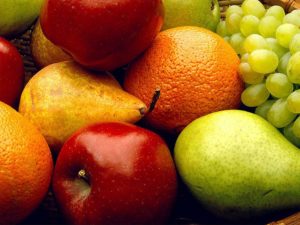
The male body needs zinc, selenium, vitamins B, C, D, A, E for health and proper functioning. At the same time, a large amount of iron and copper can be harmful and cause disruption of the heart. A healthy men's menu should include apricots, pomegranates, avocados, bananas, oranges, grapes, and mangoes. The exotic fruit durian is considered a natural aphrodisiac that increases potency. The beneficial properties and composition of the fruit improve sperm quality, reduce the risk of prostate inflammation, and have a beneficial effect on male reproductive functions.
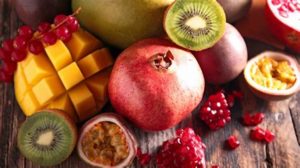
The most useful fruit for baby food is the apple. It contains iron, potassium, a complex of vitamins necessary for the growth and development of the baby. Apricots, prunes, pears will also bring benefits, which will help develop the children's digestive system.
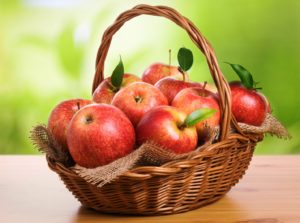
What fruits help you lose weight
A variety of diets and fasting days are based on the benefits of fruits, which allow you to maintain your figure, lose extra pounds.

Citrus fruits are recognized as the leaders in fat burning. They contain useful flavonoids - substances whose properties prevent the formation of fatty deposits, improve metabolic processes.
Oranges, tangerines, lemons, grapefruit are low in calories, break down fats from other foods, and contain a loading dose of useful vitamin C.
Kiwi also contains a significant amount of useful ascorbic acid, potassium, magnesium, sodium, fiber. The fetus normalizes protein metabolism, promotes weight loss.
The recommended nutritional intake is 2-3 fruits a day, in the form of fruit salad, freshly squeezed juice, smoothies. Eating citrus fruits on an empty stomach is not recommended as it can be harmful due to the active production of gastric juice.
Pineapple is also beneficial for weight loss. It includes bromelain, which has the beneficial properties of accelerating the breakdown of fat. To eliminate the feeling of heaviness, easy assimilation of food, you need to drink a glass of pineapple juice or eat a few slices of fresh fruit after eating.
Apples and pears are the most affordable and popular fruits for weight loss, rich in a balanced mineral and vitamin complex, antioxidants, insoluble fiber, organic, fruit acids.
During fasting days, you can eat up to 1.5 - 2 kg of apples.
Benefits of fruits for children
Healthy fruits are introduced into the child's diet in the form of puree from 5 to 6 months of age. Due to their structure and useful properties, they develop the digestive system of the child's body, prepare it for adult food. Fruit purees and juices are a source of beneficial macro and micronutrients. The hard fruits help to strengthen the teeth and gums. It is important to closely monitor your baby's reaction to a new product.
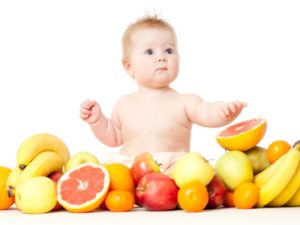
For children of kindergarten and primary school age, only food allergies can serve as a restriction in the use of fruits. In its absence, the fruits offered for breakfast bring great benefits: they activate metabolism and digestion, charge with the necessary energy, stimulate the brain and the production of serotonin (the hormone of joy).
What fruits can you give your child
Pediatricians recommend that the introduction of healthy fruit foods into an infant's diet begins with a green apple at around 6 months of age. It is the least allergenic food, rich in iron and fiber.
From 7 - 8 months, you can add pear, peach, apricot, plum, red apples. With the benefits of cherries, cherries, a baby can get acquainted by 10 - 12 months.
Bananas, grapes, citrus fruits are not recommended to be given to a child under 2.5-3 years old: they can harm a fragile child's body, cause indigestion, allergies.
Is it possible to give children exotic fruits
According to pediatricians, the introduction of exotic foods into the child's diet, the benefits of which are in doubt, should be postponed until 3 years. Exotics can be harmful: the baby's digestion will not cope with the processing of unusual food, allergies and stool disorders will develop.
You should not completely abandon the use of exotic fruits, since they can be useful for a growing child:
- pomegranate contains vitamins C, A, B, iron, iodine, potassium, silicon. Pomegranate juice has antipyretic properties, increases hemoglobin levels, and helps prevent infection with helminths;
- pomelo has antiviral properties due to the high content of ascorbic acid;
- mango is rich in beneficial beta-carotene, which is necessary for the production of vitamin A;
- in pineapples there is a complex of useful microelements that stimulate digestion.
Children do not feel an urgent need to eat exotic foods.
How to eat fruit properly
Recommendations for the use of fruits for food have been developed, thanks to which you can get the maximum benefit from the fruits, minimize harm, reveal their properties beneficial to health.
How many fruits can you eat per day
The rate of fruit consumption depends on gender, physique, individual tolerance. The general recommendation is no more than 200 - 300 g per day.
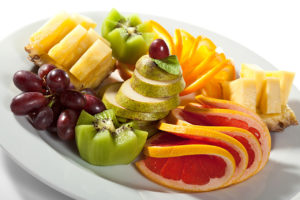
Men, athletes and people leading an active lifestyle can eat up to 0.5 kg of various fruits without harm to health.
Women, as well as overweight people, are advised to pay attention to the calorie content of the product. One serving should not exceed 60 kcal. This is one medium apple, a bunch of grapes, half a banana or grapefruit, 2 peaches or a tangerine. You can eat no more than 2 such portions per day.
Is it possible to eat fruit at night
Fruit can bring benefits or harm when consumed at night: this is due to the glucose content in them. It is not recommended to eat sweet fruits after 6 pm. Insulin production at this time decreases, the body does not have time to process sugar and stores it in the form of fat cells.
Fruits such as pears, grapes, apples are also not recommended before bedtime, as they increase the production of gastric juice and stimulate appetite.
The ideal fruit to eat for dinner is citrus. This is due to their high digestibility and low calorie content. Thanks to their properties, they help to relax, overcome insomnia, and normalize the work of the heart and brain.
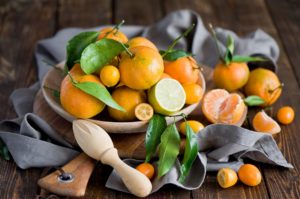
It is permissible to include mango and figs in a healthy evening snack. They are combined with fermented milk products, normalize the work of the gastric mucosa, and satisfy hunger.
When is it better to eat fruit: before or after meals
Nutritionists agree that fruit is good for you 30 minutes before your main meal or an hour after.
The maximum benefit is brought by fruits eaten on an empty stomach: this way they freely enter the large intestine, where they are actively broken down and microelements are absorbed. Their beneficial properties are manifested in stimulating intestinal motility, facilitating defective detection, eliminating gas formation and fermentation processes.
In what form is it better to eat fruits
The healing properties of fruits are manifested when they are consumed fresh, uncut.
As a result of heat treatment, part of the useful macro- and microelements is destroyed, in particular, vitamin C.
Whole fruits will be of great benefit: they create the necessary load on the jaw, teeth, cleanse them, and stimulate intestinal peristalsis. They better preserve fiber, which is necessary for cleansing the digestive tract.
Frozen foods are also suitable for healthy nutrition: they retain a large share of the beneficial properties.
The least benefit, and sometimes harm, comes from canned fruits. Heat treatment kills vitamins, sweet syrup raises sugar levels.
What fruits are combined with
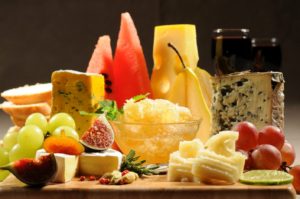
The beneficial use of fruits involves their harmonious combination with other fruits, foods, drinks:
- Sweet fruits are combined with each other, as well as cream, dairy products, cottage cheese, sour cream, cereals, milk.
- Sweet and sour (apple, apricot) - compatible with vegetables, cereals, sour milk, protein products, herbs, bread, meat, cheese.
- Sour (especially citrus fruits) are ideal for meat, nuts, fish, seafood, starchy vegetables.
The following combinations can cause harm:
- Mango, grapefruit, durian - with alcohol. They block the production of liver enzymes, increase the harm and effect of drinks, cause diarrhea, poisoning, and intoxication.
- Sweet and dried fruits, along with sour ones, take longer to digest, cause bloating, increased gas formation.
In addition, grapefruit is dangerous to combine with drugs for hypertension, heart medications, antibiotics. They enhance the absorption of drugs by the liver, kidneys, cause an overdose, deterioration.
The use of fruits in cooking
Many healthy salads, smoothies, cocktails, preserves, jam, mashed potatoes, juices, compotes can be prepared from fruits. Fresh, dried, frozen fruits are used as fillings for pies, casseroles, cereals.
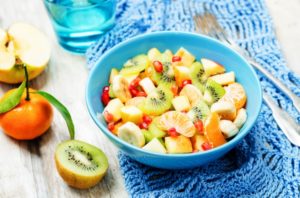
Recipe 1: Fruit Salad
Ingredients:
- green and yellow apple - 1 pc.;
- tangerine - 1 - 2 pcs.;
- banana - 1 pc.;
- pear (hard) - 1 pc.;
- grapes (raisins) - 15 - 20 pcs.;
- lemon juice - ½ tsp;
- natural yogurt - 2 - 3 tbsp. l .;
- vanillin, cinnamon - to taste.
Preparation:
- Rinse the food thoroughly, peel the banana and tangerine.
- Cut the apples into medium cubes, drizzle lightly with lemon juice.
- Cut the banana and pear into cubes. Divide large grape berries into 4 parts, remove seeds. Kishmish grapes can be left whole or cut in half.
- You do not need to grind tangerine slices: they will give a lot of excess juice.
- Mix all the chopped ingredients in a deep cup, pour over the yogurt, add vanillin and cinnamon to taste.
The health benefits of fruit salad lie in the complex of natural vitamins, microelements that enter the body in a fresh, not processed form. Do not add sugar, heavy cream, cookies to the salad. Such a dish will do more harm than good, since the digestion process will be delayed, the body will receive a significant dose of sugar and unnecessary calories.
Health benefits come from freshly made smoothies - fruits that are minced with a blender to a puree state.
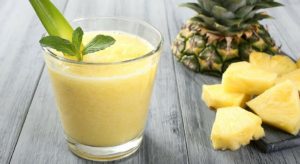
Recipe 2: Pineapple Citrus Smoothie for Weight Loss
Ingredients:
- pineapple - 200 g;
- orange - 200 g;
- orange juice - 40 ml;
- honey - 2 tsp;
- ice - 5 cubes.
Preparation:
- Rinse fresh fruits, cut into small wedges. Squeeze the juice out of the orange.
- Place all ingredients in a blender bowl, add ice.
- Purée, season with a spoonful of honey.
- An invigorating and healthy cocktail is ready!
Unlike fruit juices, smoothies preserve all the beneficial properties of the starting products as much as possible, fiber is present.
Potential harm to fruits
Fruits can bring not only health benefits, but also have significant harm when they are unbalanced in food:
- the abuse of citrus fruits causes allergic rashes, itching, flaking of the skin;
- a large number of sweet bananas are harmful to health, threatens the development of varicose veins, the formation of cholesterol plaques;
- oranges, pomegranate, lemon harm the tooth enamel, destroying it;
- peaches, apricots, nectarines take a long time to digest, cause a feeling of heaviness;
- plums, grapes, as well as exotic fruits, due to their laxative properties, become the root cause of diarrhea.
Contraindications to eating fruit
Fruit may be contraindicated in the presence of certain diseases:
- citrus fruits, as well as fruits with a red or orange color, activate allergic reactions;
- sweet bananas, pears, figs cause surges in glucose, therefore, are contraindicated for people with diabetes mellitus;
- bananas are dangerous for hypertensive patients due to the property of increasing blood pressure;
- fruits with a hard shell harm the gastrointestinal system with pancreatitis, gastritis, ulcers, diseases of the gallbladder;
- in children under one year old, pregnant and lactating women, fresh fruits can cause problems with digestibility;
- plums are contraindicated in people prone to diarrhea.
An important contraindication is infancy (up to 6 months), due to the lack of enzymes responsible for the breakdown of fruit acids. At this age, they will harm the baby's digestion, cause increased gas production, colic.
How to choose and store fruits
It is worth buying food only in specialized retail outlets, supermarkets, and vegetable stores. This way you can get more confidence in their safety, benefit and compliance with sanitary and epidemiological standards. Hand-bought products may contain hazardous compounds, therefore they can be harmful to health.
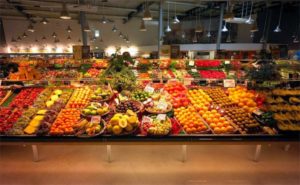
Healthy fruits should be of a natural natural color, without visible damage, rot, with a pleasant, persistent aroma. Conversely, spoiled fruits, soft, withered, with an unpleasant odor can be harmful to health.
Fruit storage conditions:
- apples, pears are stored at room temperature, isolated from each other;
- citrus fruits are wrapped in newspaper, placed in a box and sent to a dark, cool place;
- ripe bananas, grapes, mangoes keep freshness in the refrigerator longer;
- unripe fruit should be stored at about 14 oC, so they retain their useful properties.
Shelf life:
- apples, pears, grapes, lemons and oranges keep their freshness the longest - up to 120 days;
- grapefruit, kiwi - up to 90 days;
- unripe bananas, pineapples - 60 days;
- tangerines, peaches, plums, apricots, mangoes - no more than 20 - 30 days;
- cherries, bananas, soft pears - up to 10 days.
If it is supposed to be stored for a long time, it is better to freeze the fruit, dry it, make jam, compote from them - to preserve the beneficial properties, to minimize possible harm to health.
Conclusion
The health benefits and harms of fruits are determined based on the individual characteristics and needs of the human body.Compliance with the recommended daily allowance, the right choice, adherence to storage conditions, help to get a powerful charge of vitamins. It is important to take fruits at least an hour before meals or as a healthy snack, fresh, without sugar and additional fats - this will reveal their beneficial properties more fully.

